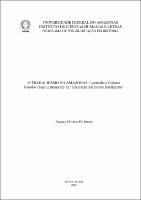| ???jsp.display-item.social.title??? |


|
Please use this identifier to cite or link to this item:
https://tede.ufam.edu.br/handle/tede/6269| ???metadata.dc.type???: | Dissertação |
| Title: | O trabalhismo no Amazonas: o periódico Tribuna Popular como instrumento de “orientação das hostes trabalhistas” |
| ???metadata.dc.creator???: | Pio Junior, Amaury Oliveira  |
| ???metadata.dc.contributor.advisor1???: | Queirós, César Augusto Bubolz |
| ???metadata.dc.contributor.referee2???: | Pinheiro, Luís Balkar Sá Peixoto |
| ???metadata.dc.contributor.referee3???: | Fontes, Edilza |
| ???metadata.dc.description.resumo???: | Esta dissertação tem por objetivo analisar o processo de surgimento e gestação do Movimento Trabalhista no Estado do Amazonas, por volta da primeira metade da década de 1930. Esse período seria caracterizado pelos desdobramentos, em todo país, da ascensão de Getúlio Vargas como presidente do então Governo Provisório. O Amazonas, sob tal contexto, assistiria ao reordenamento de suas forças políticas. O enfraquecimento do sistema oligárquico oportunizaria a projeção de novas lideranças políticas regionais que, naquele momento, colocavam-se à disposição dos projetos pretendidos por Vargas. Ao mesmo tempo, vivenciaríamos ali importantes transformações nas relações entre governos e sindicatos, indicadas pela criação do Ministério do Trabalho, Indústria e Comércio em fins de 1930. A partir de então, o movimento sindical passa a ser melhor observado por algumas lideranças políticas que, no caso do Amazonas, alinham-se com esse segmento, chegando, em alguns casos, a atuarem como agentes da política varguista junto às organizações de trabalhadores. Nesse contexto, algumas lideranças como Álvaro Botelho Maia e Luís Tirelli passam a destacar-se no quadro político local. À frente do Partido Socialista Amazonense (PSA) e do Partido Trabalhista Amazonense (PTA), respectivamente, suas atuações foram fundamentais em agregarem em torno de si as principais forças políticas daquele período no Estado. Seus desempenhos nos processos eleitorais de 1933, 1934 e 1935 destacaram-nos enquanto agentes político-partidários, num primeiro momento em posições antagônicas para, logo em seguida, sob uma única legenda – o Partido Popular Amazonense (PPA) - seguirem como aliados em torno das propostas de Getúlio Vargas. Em meio a esse cenário, a fundação do periódico Tribuna Popular, primeiro como órgão de divulgação do PTA e, posteriormente, vinculado ao PPA, revela-se como uma fonte primorosa sob o período e as lideranças partidárias acima mencionadas. Sua periodicidade entre os anos de 1933 e 1936, além de permitir traçar a constituição do perfil político do Amazonas, desperta-nos para sua outra função, que era oferecer-se enquanto espaço para que as propostas Trabalhistas pudessem, ao longo desses anos, esboçarem suas propostas, anseios e discussões sobre parte do mundo operário e sindical da época. |
| Abstract: | This thesis aims to analyze the process of Workforce Movement's emergence and elaboration in Amazonas in early 1930s. This period was characterized by the rise of Getulio Vargas as president of the provisional Government. Amazonas, in this context, lived the reordering of its political forces. The fading of the oligarchic system, gave oppotunity to the projection of a new regional political leadership of Vargas' projects. At the same time, we were living important changes in the relationship between governments and unions, indicated by the foundation of the Ministry of Labor, Industry and Commerce in late 1930. Since then, the union movement becomes better observed by some political leaders who, in Amazonas, came to align themselves with this segment, and in some cases, acted as agents of Vargas policy with workers' organizations. In this context, some leaders such as Álvaro Botelho Maia and Luís Tirelli begin to stand out in the local political context. The Partido Socialista Amazonense (PSA) and the Partido Trabalhista Amazonense (PTA) respectively, their performances were extremely important in aggregating the main political forces of that period in Amazonas. Their performances in the elections of 1933, 1934 and 1935 highlighted as political party agents, at first in antagonistic positions, and then, under one party - Partido Popular Amazonense - (PPA) - became allies of the Getulio Vargas' proposals. In this scenario, Tribuna Popular newspaper's foundation, first as the PTA disclosure institution and subsequently linked to the PPA, is revealed as an important information source in that period, and the aforementioned party leaders. Its periodicity between 1933 and 1936, not only allows to build the constitution of the political Amazonas profile, but also alert us to their other function, which was to offer itself as a place for the labor proposals draft their proposals, concerns and discussions about some of the people involved in the workforce and trade union world at that time. |
| Keywords: | Movimento Trabalhista Sindicalismo Tribuna Popular Partido Socialista Amazonense (PSA) Partido Trabalhista Amazonense (PTA) |
| ???metadata.dc.subject.cnpq???: | CIENCIAS HUMANAS: HISTORIA |
| Language: | por |
| ???metadata.dc.publisher.country???: | Brasil |
| Publisher: | Universidade Federal do Amazonas |
| ???metadata.dc.publisher.initials???: | UFAM |
| ???metadata.dc.publisher.department???: | Instituto de Filosofia, Ciências Humanas e Sociais |
| ???metadata.dc.publisher.program???: | Programa de Pós-graduação em História |
| Citation: | PIO JUNIOR, Amaury Oliveira. O trabalhismo no Amazonas: o periódico Tribuna Popular como instrumento de “orientação das hostes trabalhistas”. 2015. 131 f. Dissertação (Mestrado em História) - Universidade Federal do Amazonas, Manaus, 2015. |
| ???metadata.dc.rights???: | Acesso Aberto |
| ???metadata.dc.rights.uri???: | http://creativecommons.org/licenses/by-nc-nd/4.0/ |
| URI: | https://tede.ufam.edu.br/handle/tede/6269 |
| Issue Date: | 15-Sep-2016 |
| Appears in Collections: | Mestrado em História |
Files in This Item:
| File | Description | Size | Format | |
|---|---|---|---|---|
| Dissertação_Amaury O. Pio Junior.pdf | 2.5 MB | Adobe PDF |  Download/Open Preview |
This item is licensed under a Creative Commons License





